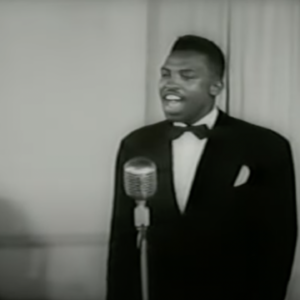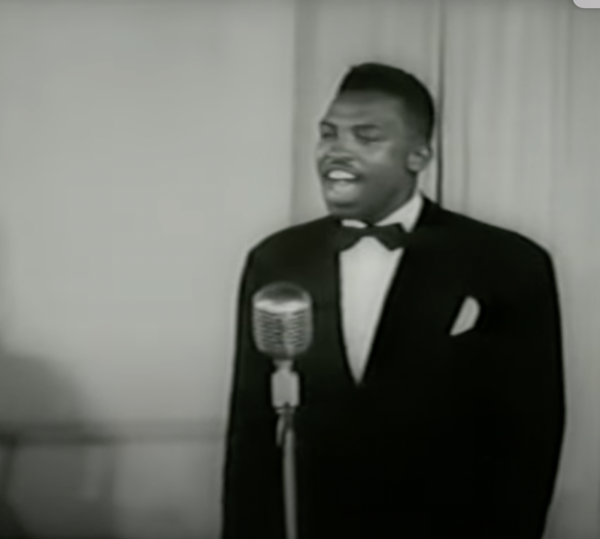
Joe Little frame from “Pitch a Boogie Woogie” video
Joe Little, vocalist, “Te Quiero” and backup singer on “I Heard You Say”
Rev. Dr. Joseph E. Little (1923 – 2006), a Greenville native, had just graduated from Eppes High School in 1947 when he performed in “Pitch a Boogie Woogie.” He washed dishes at Bell’s Restaurant on the Block and enjoyed singing in local clubs and talent shows.
“I knew Mr. Warner personally,” he said, “and I did a lot of singing, so I was known in the neighborhood. I would sing in clubs and like that, and so that’s how Mr. Warner asked me would I be in the picture. I was nonchalant. ‘A picture?’ I thought he was fooling. But my parents said go ahead if that’s what I wanted to do, so I said, ‘I’ll try it.'”
He was friends with most of the local cast, including James and Mary Clark with whom he sang in “Pitch” as The Three Melodiers, backing up Esther Mae Porteur. He also identified his friend, Hazel Carmon, and Robert Belcher as swing dancers in a “Pitch” nightclub scene.
He enjoyed making “Pitch,” he said. He recalled “nice weather” during production, that he was wearing a tuxedo, and he made about $50. “They had to retake some of my scene,” he added. “They took my voice over again when something didn’t take. I had lyrics and taped music to sing by.” He’ll insist several times over the course of our conversations that no band was present when he recorded. “They had music and I had to study it. Somebody helped me with it, taught me how to read it.”
There were also some post-production problems, he said: “Something happened and they had sent the film to Raleigh, and I had to do my part over again, and some people said, ‘Oh no’ but I was glad ’cause I wanted to do it over again. ‘Te Quiero. It was something new.”
I asked him what the premier was like.
At the premier, I had to leave. I was shy then. Yes. I was on the front seat. You feel like you kind of move down in the seat a little because you see yourself on the screen, and so you kind of move a little in the seat, a little shyness will come over you, and a beautiful feeling when you say, Look at me! What is this? So that’s a beautiful feeling, a feeling of joy, because there you are on the screen, and it’s almost unbelievable.
I stayed and saw the whole picture, but I went out the back of the theater when it was over, because there were too many peoples waiting on the outside. I had to get up and leave. When they showed that film, I left the theater and went straight home. People were waiting for me to come out of the theater, and when I got home, my sister said, ‘What are you doing home–everyone is waiting.’ And I said, “I don’t know, I can’t go through that.’ And they laughed, they teased me about it. I left the theater! I wouldn’t come out front. I said, ‘I can’t take this.’ There were so many people! The place was packed. Greenville all round–My song was on the screen and I’m sitting in the audience looking at people, they’re looking at me. They stayed around so I said I got to get out of here. That was too big for me for me at the time. I had it bad. But when I was singing, at that time, I was at ease. I put my whole heart into what I was doing. I didn’t play with it–I sung it. But yet when I was finished, I had a shyness. But I’m bold now.
How was it in the next few days, I wondered.
I was up in the air. ‘Cause everybody was talking, everybody’d see you, ‘That’s Joe Little, there he goes.’ For about a month, peoples would say they liked it and be talking about it everywhere you’d go. I was a celebrity, I was a celebrity. Everywhere I went those who saw it, white and colored, was talking about it. The cooks, they told me I heard about you and I wish I could have seen it, I know you done well.
And that’s when I finally stopped the shyness. Seeing all that, seeing yourself on the screen for the first time, I almost fell out of the seat. It’s something to think about.
I would say this: that picture can give you an idea that you can better your position in any respect of life. It doesn’t have to be in a musical field, it could be in any field you are capable of doing in a higher echelon. By seeing this picture it can make you think twice that you are somebody, if you really want to be somebody. See, Greenville wasn’t a Hollywood. Greenville was a small city, no studio, but they took this picture “Pitch a Boogie Woogie” and made it with what they had in the community, all kinds of peoples that made up the community–different personalities, different jobs, so they did a beautiful job, because it didn’t have to be in Hollywood, it was done right in Greenville, a small city, with the material they had right in the city.
Soon after making “Pitch,” Joe Little left for New York and then Boston finding work as a substitute teacher, hoping for a teaching career, before returning to North Carolina to earn a 1955 degree from NC A & T, where he continued his singing with the touring choir. During a two-year stint in Newark, NJ, working again as a substitute teacher, he began taking classes at Newark Bible College and Glad Tidings Church. “Then I went into New York to take classes,” he said, “and began getting into the religious field deeper.” He earned his Doctorate in Divinity from Kings College in Des Moines, Iowa, and became pastor at Cherry Noah’s Ark Holiness Church in Newark, NJ, in 1985.
He married Bettie Carney, also of Greenville, who was a career educator. Their son, Raheim, was a teenager when I last saw him. I spent a few delightful days in Newark in 1987 as Susan Massengale and her UNC-TV crew and I filmed Boogie in Black and White; we were all honored at an elaborate banquet where the Littles gave me the first of many gifts they’d present me over the next few years.
The first time I met Joe and Bettie Little was in Greenville, at his sister, Odessa Johnson’s home. We went from there to the Harding Street home where my wife, Elizabeth, and I lived, for a pre-interview with Joe. My notes from later in the day: “Joe Little at my house. He and his wife show up in the white Continental, bearing gift of soup pot, very nice sorta ceramic thing. And they settle in, Susan [Massengale] having arrived a few minutes before. It’s about 10:20 a.m. and they’ve apparently done this drive [from Newark] more for us than we’d realized. They sit about for the interview, E comes in for luch, gets to speak to them as we’re leaving, to go back to Odessa’s house, where we see Buster [Little] and his wife. Buster plays some gospel spoons, Joes gets on the organ, and they all join in on some gospel. “We gotta leave, though, cause we’re on the road to Fayetteville,” he says, so they only make a couple of numbers. But anyway, Joe says: ‘Greenville was smaller then. The block was where everybody met. . . ‘
He moved Noah’s Art Holiness Church to Weldon, NC, where he died on September 9, 2006.
Sources
Little, Joe. Personal interview. Greenville, NC. 6 July 1987.
—. Telephone interview. 15 July 1985.

Joe Little post card from nitrate frame. Chinstrap Productions, 1984.
–August 8, 2024
